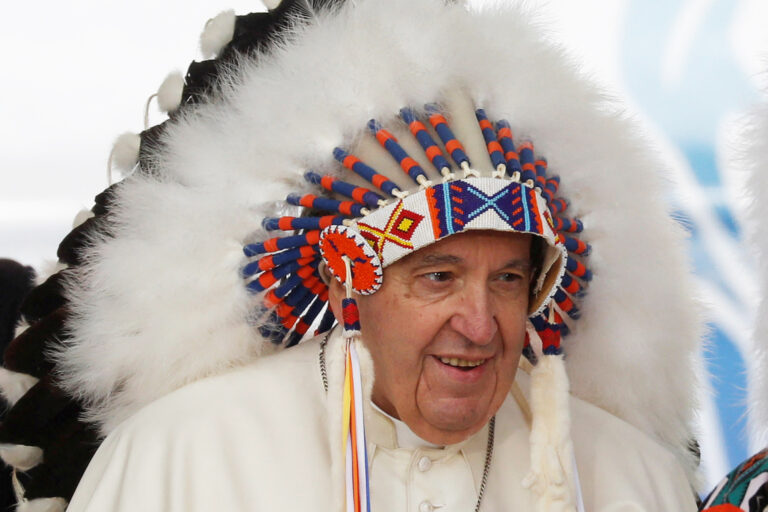Excitement over the Synod on Synodality in Canada is muted at best. At least in official clerical leadership circles. The Canadian Conference of Catholic Bishops (CCCB) has been much occupied by what they the bishops see as issues of greater pastoral urgency: the ongoing fiscal and operational issues following Pope Francis’s welcome and historic visit to Canada in July to offer an apology for the residential schools for Indigenous children administered by the Church but for the federal government and with a sorry history of abuse; the continued decline in church attendance in most jurisdictions with the accompanying pain of parish clusters, aging clerics, with a corresponding steep decline in financial offerings; and the shocking realisation coming from the recent Statistics Canada census that the Catholic population of the country is at 30% and is now below the 34% that self-declare as non-religious.
Forgiven
The bishops can be forgiven for seeing more pressing priorities than another Roman Synod. They have been dutiful in submitting their surveys, reports and commentaries to the Vatican but there has been very little beyond the minimal and predictable in their efforts. Some prelates are waiting out the papacy of the current Bishop of Rome, many others are fervently loyal to Francis but with little leadership energy, and there are a few, both Metropolitans and Ordinaries, who are genuinely enthusiastic about this Synod and its limitless potential for a re-charged ecclesia.
Contrast
In contrast to episcopal lethargy you can find several lay-specific initiatives like the wide consultation and subsequent summary report by the Catholic Network for Women’s Equality, Canada (CNWE) which was thorough in its research and elegant in its conclusions. Its thrust and purpose are best articulated in this passage from its summary report, Embodying a Listening, Inclusive, Synodal Church: The Time is Now: “Amid the ‘signs of our times’, which at present seem very dire, the Spirit is calling us to a radically new way of being Church.
Relearning the gospel values that Jesus proclaimed and modelled involves much less reliance on rules, restrictions and fossilised structures, and a much greater openness to listen humbly and attentively to the voices of marginalised communities, with a willingness to embrace positive change”.
Process
Because the CCCB did not have a formal process in place for receiving submissions from National Catholic movements and entities outside the diocesan/canonical orbit, CNWE sent its report directly to the Vatican Synod Office and to Sr Nathalie Becquart, the Undersecretary of the General Secretariat of the Synod of Bishops. They did this in August of this year.
In November, another pan-national collective called Concerned Lay Catholics (CLC) mounted various consultations and hosted Zoom panels, one of which, Synodal Stories of Hope From Across Canada (November 6, 2022) drew on the wide range of experience to be found in a large, disparate and often riven Canadian Church.
Panellists were drawn from coast to coast – British Columbia, Ontario, Quebec, and Nova Scotia – and they included some local Curia folk, faith formation animators, and a lay minister and doctoral student in theology.
The regionalism of the panellists was its strength but expansive and fearless visionary thinking was lacking. Such was not lacking in a special panel held under the auspices of St. Michael’s College, University of Toronto on November 10. Entitled: Doing Theology from the Existential Peripheries, the panel originated out of a project of the same name involving several theologians drawn from Mexico, the United States, and Canada. Both the report (some 100 pages) and the panel (over 2 hours) unmuted the peripheries.
Methodology
The panel outlined in some detail the methodology employed and the constituencies consulted: Chicago, Ciudad Juarez, El Paso, Los Angeles, Quebec, New York, Peterborough, San Diego, and Toronto. “These cities were chosen as representative cities of the North American demographics and special effort was made to reach the people whose voices are often muted in our churches in North America, especially the indigenous populations, migrants and refugees, prisoners, and LGBTQ+ among others.”
Amidst the national turmoil over the papal apology for the residential schools, the credibility issue of CCCB leadership, and the tepid response to Pope Francis’s call for a new ecclesiology, the struggles of Catholic lay organisations and academics to secure a hearing is nothing short of heroic. Only the Synod itself will show whether their labours were Herculean or Sisyphean.
Michael W. Higgins, Basilian Distinguished Professor of Contemporary Catholic
Thought, St Michael’s College, University of Toronto and Distinguished Professor of Catholic Thought Emeritus, Sacred Heart University, Fairfield, Connecticut.



